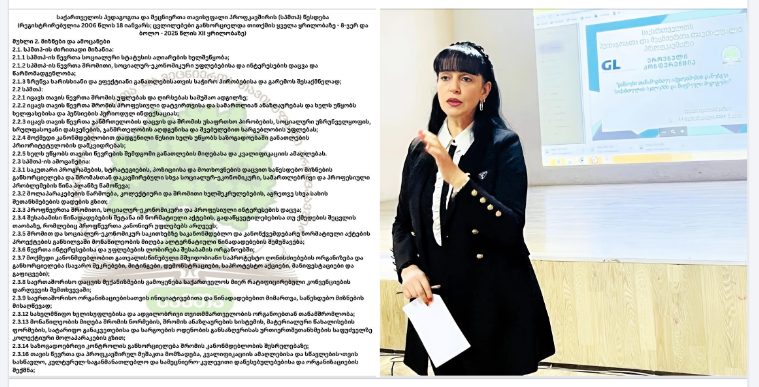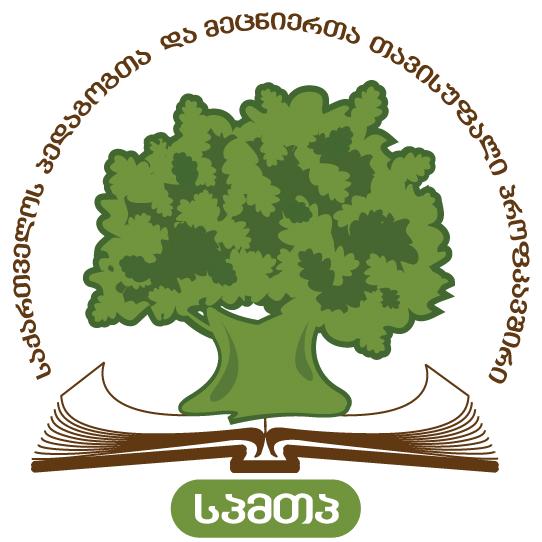As you are aware, on March 6, 2024, a new organization claiming to defend the interests of teachers – the “Union of Education Workers” – was established. During the period that followed, we did not issue any statements that could harm the newly formed organization, as we were genuinely interested to see what new ideas this organization would offer for the development of the trade union movement and the protection of teachers’ labor, social-economic, and legal rights.
In return, we have received a blatant campaign and a cascade of accusations directed at ESFTUG. We had no intention of responding to these slanders – until now. We feel compelled to react due to their most recent public information concerning a letter sent to the Minister of Education, Science, and Youth.
In this letter, the aforementioned organization demands that teachers who are members of the Educators and Scientists Free Trade Union of Georgia (ESFTUG) not be allowed to be elected as members of school boards of trustees. They demand this on irrational interpretations of ESFTUG’s constitution, claiming that the election of an ESFTUG member to a school board would infringe on the rights of non-members and would pose a "clear and evident threat of discrimination" against teachers who are not members of their organization.
We would like to explain to the authors of this idea:
Article 2 of the ESFTUG Constitution consists of 25 clauses, which address the interests of both members and non-members. For example, Clause 2.1.3 defines one of ESFTUG’s core goals as: “to strive for creating the conditions and environment necessary for quality and effective education.” ESFTUG defends and advocates not only for its members but for all employees. Therefore, it is completely incomprehensible to interpret our statute in such a way as to prohibit our members from participating in elections on the basis of the term “advocacy.”
This leads to a question:
How should elections be conducted in schools where the overwhelming majority of teachers are members of our union?
And who has the authority to deny election rights to over 60% of teachers who are our members?
According to Article 57 of the Labor Code of Georgia, if more than 50% of employees in a workplace are members of a trade union, then non-members have the right to request that the conditions of the collective agreement and other benefits be applied to them as well.
We advise the newly formed organization to carefully study the current Georgian legislation, which clearly states that legislative or sub-legislative changes achieved through trade union advocacy apply to all employees.
For instance, 21 legislative changes initiated and promoted by our union have benefitted all teachers/employees, not only ESFTUG members.
We are also aware that this organization has only a very small percentage of employees as members. It would be appropriate for them to publish their membership statistics. It remains unclear whom they represent, on whose behalf they speak, and whose interests they claim to defend.
If they do have members, no one is preventing them – or non-member teachers – from running as candidates for the school board. This right is guaranteed by law. Therefore, the expressed concern by the leaders and founders of this organization, as if they are excluded from the process, is, to put it mildly, disingenuous.
This organization should uphold democratic values. It is absurd that it engages in discrimination on the basis of trade union membership while simultaneously demanding inclusivity. We remind them of Article 2.3 of the Labor Code of Georgia, which states:
“Any form of discrimination is prohibited, including on the grounds of trade union affiliation, membership, family status, political or other views.”
We urge the authors of the letter and this idea to first build a real organization, understand the fundamental values of trade unionism – what representation means and what its function is – and then seek the right to engage in collective bargaining.
At present, the “Union of Educational Workers” represents only the private interests of its founders. It is paradoxical that the head of this organization, in a video address, openly states that he cannot stand the word “trade union.” Moreover, one of their members is a former school principal who was dismissed from the Ministry of Education based on two disciplinary sanctions – for illegally dismissing teachers, persecuting them based on trade union affiliation, and exerting pressure on them.
We suggest reviewing the biography of this former principal, his attitude towards teachers, and previous activities aimed at discrediting trade unions as institutions.
Respectfully,
Maia Kobakhidze
President of the Educators and Scientists Free Trade Union of Georgia (ESFTU



